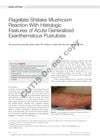34 citations,
October 2011 in “Journal of the American Academy of Dermatology” Sarcoidosis is more common and severe in Black patients than in Caucasians, requiring early diagnosis and treatment.
 January 2017 in “Springer eBooks”
January 2017 in “Springer eBooks” The document explains various skin conditions and their treatments.
 1 citations,
January 2010 in “Elsevier eBooks”
1 citations,
January 2010 in “Elsevier eBooks” Any drug can cause skin reactions, but antibiotics, NSAIDs, and psychotropic drugs are more common, with some reactions being life-threatening.
 1 citations,
September 2020 in “Cochrane library (CD-ROM)”
1 citations,
September 2020 in “Cochrane library (CD-ROM)” The analysis aims to identify the most effective and safest treatments for alopecia areata.
 October 2022 in “Journal of experimental and clinical medicine”
October 2022 in “Journal of experimental and clinical medicine” Repurposing existing drugs for COVID-19 shows promise but requires more research to confirm effectiveness.

Tumid lupus erythematosus can cause non-scarring hair loss on the scalp and requires careful diagnosis.
 13 citations,
November 2021 in “Frontiers in Immunology”
13 citations,
November 2021 in “Frontiers in Immunology” Melatonin could be an effective treatment for Alzheimer's Disease and rosacea.
 November 2024 in “PubMed”
November 2024 in “PubMed” Terbinafine can cause skin reactions when exposed to sunlight, so sun exposure should be avoided during treatment.
 January 2019 in “ARC journal of pharmaceutical sciences”
January 2019 in “ARC journal of pharmaceutical sciences” Acne can be managed with various treatments and requires psychological support due to its emotional impact.
 1 citations,
July 2024 in “Journal of the European Academy of Dermatology and Venereology”
1 citations,
July 2024 in “Journal of the European Academy of Dermatology and Venereology” Oral dutasteride is effective and safe for treating frontal fibrosing alopecia.
 September 2019 in “Actas dermo-sifiliográficas/Actas dermo-sifiliográficas”
September 2019 in “Actas dermo-sifiliográficas/Actas dermo-sifiliográficas” Isotretinoin at low doses effectively treats facial papules in frontal fibrosing alopecia.
 58 citations,
November 2020 in “International Journal of Dermatology”
58 citations,
November 2020 in “International Journal of Dermatology” COVID-19 may cause a temporary hair loss condition called telogen effluvium in some patients after recovery.
2 citations,
November 2020 in “BJCP. British journal of clinical pharmacology/British journal of clinical pharmacology” Redefining drug dosages is crucial when repurposing them for new uses.
 February 2016 in “Acta Medica Marisiensis”
February 2016 in “Acta Medica Marisiensis” A woman with chronic hepatitis C had a rare skin condition linked to her illness.
 155 citations,
June 2009 in “International Journal of Dermatology”
155 citations,
June 2009 in “International Journal of Dermatology” Lichen planus is a skin condition that can resolve on its own, is linked to hepatitis C, and increases the risk of skin cancer.
 1 citations,
July 2020 in “Journal of cosmetic dermatology”
1 citations,
July 2020 in “Journal of cosmetic dermatology” A woman on immunosuppressants developed two rare scalp conditions, which improved with specific treatments.
 January 2016 in “Skin appendage disorders”
January 2016 in “Skin appendage disorders” The document discusses various nail and hair disorders and their treatments.
 18 citations,
June 2019 in “Clinical research in dermatology”
18 citations,
June 2019 in “Clinical research in dermatology” Acne can't be cured but can be managed with treatments like benzoyl peroxide and diet changes; it's costly and can lead to scarring and mental health issues.
 27 citations,
September 2018 in “Skin appendage disorders”
27 citations,
September 2018 in “Skin appendage disorders” Hair transplantation may work for some types of scarring alopecia, but results vary and more research is needed.
 1 citations,
July 2018 in “Elsevier eBooks”
1 citations,
July 2018 in “Elsevier eBooks” FAPD and possibly CCCA may be AGA subtypes, and treatments combining antiandrogens, hair growth agents, hair transplants, and anti-inflammatories could be effective.
 April 2017 in “Australasian Journal of Dermatology”
April 2017 in “Australasian Journal of Dermatology” The session covered updates on skin treatments, including radiotherapy, imiquimod, acitretin, JAK inhibitors, and strategies for managing rosacea and preventing surgical infections.
 3 citations,
December 2022 in “Cells”
3 citations,
December 2022 in “Cells” Cannabinoids like CBD and THC may help treat non-cancer skin diseases, but more research is needed.
 39 citations,
January 2019 in “Journal of the American Academy of Dermatology”
39 citations,
January 2019 in “Journal of the American Academy of Dermatology” Tofacitinib may help treat severe childhood alopecia areata, but risks require careful consideration.
 5 citations,
July 2023 in “International Journal of Women’s Dermatology”
5 citations,
July 2023 in “International Journal of Women’s Dermatology” Anifrolumab significantly improved skin lesions and hair regrowth in severe discoid lupus.
 October 2022 in “IntechOpen eBooks”
October 2022 in “IntechOpen eBooks” Hair loss due to scarring can be treated by reducing inflammation, removing scar tissue, and transplanting hair. The Follicular Unit Extraction technique is effective but requires skill and time. Future focus should be on scar-less healing methods.
 December 2024 in “Cureus”
December 2024 in “Cureus” Tirzepatide improved symptoms and hair regrowth in a man with folliculitis decalvans.
 July 2018 in “Elsevier eBooks”
July 2018 in “Elsevier eBooks” Discoid Lupus Erythematosus often causes scarring hair loss, is influenced by genetics and environment, and requires early treatment to prevent worsening.
 25 citations,
October 2015 in “Dermatology”
25 citations,
October 2015 in “Dermatology” Dapsone improved pustular psoriasis in patients who didn't respond to other treatments and is considered a well-tolerated option.
 3 citations,
February 2024 in “Journal of the American Academy of Dermatology”
3 citations,
February 2024 in “Journal of the American Academy of Dermatology” Topical tofacitinib cream may help treat certain hair loss conditions with fewer risks.
 2 citations,
September 2021 in “Cutis”
2 citations,
September 2021 in “Cutis” Eating shiitake mushrooms caused a man to develop a rash similar to a skin condition known as AGEP.



























